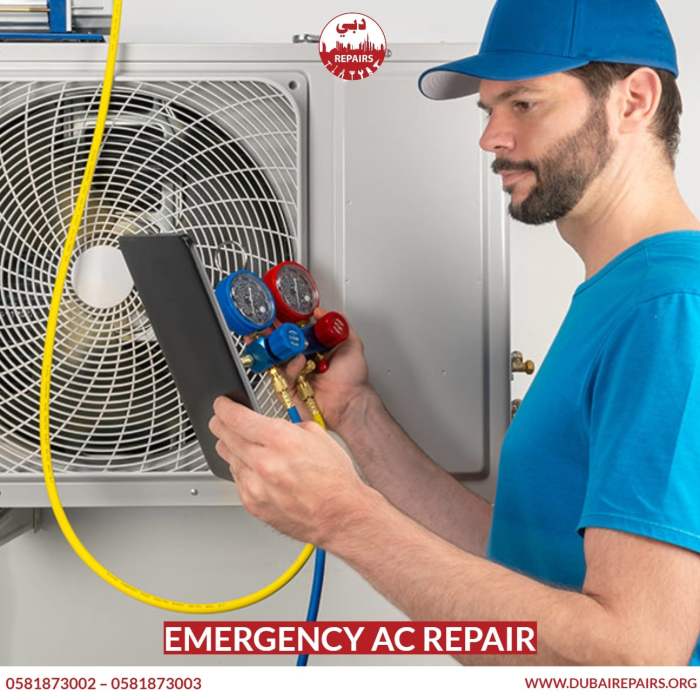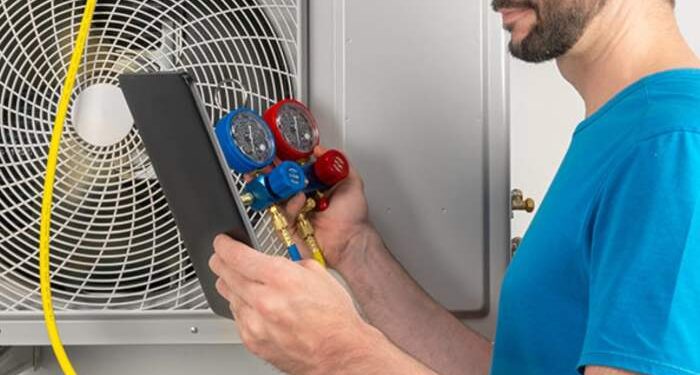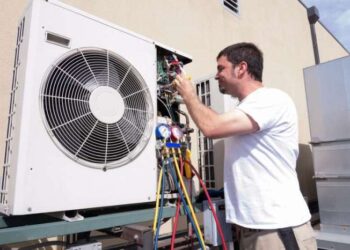In a world where unexpected AC breakdowns can disrupt our daily lives, having access to emergency AC services becomes paramount. From scorching summers to sudden malfunctions, this guide delves into the significance of emergency AC service and how it can save the day when you least expect it.
Importance of Emergency AC Service
Having access to emergency AC services is crucial for maintaining comfort, safety, and health, especially during extreme weather conditions or unforeseen circumstances.
Examples of Situations
- During heatwaves when the temperature is dangerously high, a malfunctioning AC can lead to heat-related illnesses such as heat exhaustion or heatstroke.
- In households with elderly individuals, young children, or individuals with health conditions, a broken AC can pose a serious health risk due to inadequate cooling.
- Businesses relying on a stable indoor temperature, such as hospitals, data centers, and restaurants, can suffer financial losses if their AC system fails unexpectedly.
Potential Risks
- Property damage: Without emergency AC service, a malfunctioning unit can lead to water leaks, mold growth, and electrical issues that can damage the property.
- Health risks: Poor indoor air quality resulting from a broken AC can exacerbate respiratory conditions and allergies, leading to health problems for occupants.
- Discomfort and productivity loss: In work environments, uncomfortable temperatures due to a faulty AC can decrease employee productivity and impact overall morale.
Common AC Emergencies
In a home or office setting, it is crucial to be aware of common AC emergencies that may arise unexpectedly. These issues can lead to discomfort, health risks, or damage to the AC unit if not addressed promptly.
Refrigerant Leak
Refrigerant leaks are a common emergency that requires immediate attention. Signs of a refrigerant leak include reduced cooling capacity, hissing sounds near the AC unit, or frozen coils. This emergency is urgent as it can lead to inefficient cooling and potential damage to the compressor if not fixed promptly.
Electrical Malfunction
An electrical malfunction in the AC unit can pose a serious risk of fire or electrical hazards. Symptoms of an electrical issue include tripped circuit breakers, burning smells, or sparks coming from the unit. This emergency requires immediate attention to prevent safety hazards and further damage to the AC system.
Compressor Failure
Compressor failure is a critical AC emergency that can result in the complete breakdown of the cooling system. Signs of compressor failure include warm air blowing from the vents, strange noises coming from the unit, or frequent cycling on and off.
This emergency is urgent as it can lead to costly repairs or the need for a full AC replacement if not addressed promptly.
Blocked Condensate Drain
A blocked condensate drain can cause water to back up into the AC unit, leading to water damage, mold growth, and reduced cooling efficiency. Symptoms of a blocked drain include water pooling around the unit, musty odors, or high humidity levels indoors.
This emergency should be addressed immediately to prevent further damage to the AC system and potential health risks.
Steps to Take During an AC Emergency
During an AC emergency, it's crucial to take immediate action to ensure your safety and comfort. Here are the initial steps to follow and tips to keep in mind while waiting for emergency AC service.
Initial Steps to Take
- Turn off the AC unit: If you notice any strange noises, leaks, or a burning smell coming from your AC, turn it off immediately to prevent further damage or safety hazards.
- Check the thermostat: Make sure the thermostat is set to the correct temperature and mode. Sometimes, a simple adjustment can resolve the issue.
- Inspect the air filter: A dirty or clogged air filter can restrict airflow and cause the AC to malfunction. Check and replace the filter if needed.
- Look for visible damage: Examine the AC unit for any visible signs of damage, such as frayed wires or leaks. Do not attempt to repair these yourself, but take note to inform the technician.
Troubleshooting Common AC Issues Safely
- Check the circuit breaker: Ensure that the AC unit's circuit breaker has not tripped. If it has, reset it and see if the AC starts working again.
- Clean the condenser coils: Dirty condenser coils can cause the AC to work inefficiently. Gently clean the coils with a soft brush or vacuum to improve performance.
- Inspect the ductwork: Leaks or blockages in the ductwork can hinder airflow and cooling. Look for any visible issues and seal leaks if possible.
- Monitor refrigerant levels: If you suspect a refrigerant leak, do not attempt to handle it yourself. Leave this task to the professionals to avoid health risks.
Tips for Staying Safe and Comfortable
- Stay hydrated: Keep yourself hydrated, especially in hot weather, to prevent heat-related illnesses while waiting for AC service.
- Use fans or portable AC units: Utilize fans or portable AC units to circulate air and cool down your living space until the main AC is repaired.
- Close blinds or curtains: Block out direct sunlight by closing blinds or curtains to reduce heat buildup indoors.
- Seek alternative accommodations: If the AC issue persists for an extended period, consider staying with friends or family or booking a hotel room for comfort.
Benefits of Professional Emergency AC Service
When it comes to dealing with AC emergencies, hiring a professional service can offer several benefits that can make a significant difference in the outcome.
Expertise and Experience
Professional technicians bring a wealth of knowledge and experience to the table when it comes to handling emergency AC repairs. They are trained to quickly diagnose issues and implement effective solutions, saving you time and hassle in the process.
Prevention of Further Damage
By relying on professional emergency AC services, you can prevent further damage to your AC system. Attempting to fix complex issues on your own can sometimes lead to more problems, whereas professionals can ensure that repairs are done correctly the first time, reducing the risk of costly repairs down the line.
Access to Specialized Tools
Professional AC technicians come equipped with specialized tools and equipment that are necessary for handling emergency repairs. These tools allow them to work efficiently and effectively, ensuring that your AC system is up and running as quickly as possible.
DIY Temporary Fixes

In some cases, you may encounter issues with your AC unit that require immediate attention before the professionals arrive. Here are some temporary fixes that homeowners can implement to help alleviate the problem temporarily.
Cleaning or Replacing Filters
One common issue that can affect your AC unit's performance is clogged or dirty filters. To address this, you can clean or replace the filters yourself.
- Locate the air filter in your AC unit.
- Remove the filter carefully and inspect it for dirt and debris.
- If the filter is dirty, clean it with water and mild soap, or replace it with a new one if it is beyond cleaning.
- Once cleaned or replaced, reinstall the filter back into the unit securely.
Checking Thermostat Settings
Incorrect thermostat settings can also lead to AC problems. Here's how you can check and adjust the settings:
- Ensure the thermostat is set to cool mode and the temperature is lower than the current room temperature.
- If the thermostat has a timer, make sure it is set correctly.
- Check if the thermostat batteries need replacing.
- Adjust the temperature settings as needed to see if it resolves the issue.
Clearing Debris Around the Outdoor Unit
Debris such as leaves, branches, and dirt can obstruct the airflow around your outdoor AC unit. Clearing this debris can help improve the unit's efficiency.
- Turn off the power to the unit before proceeding.
- Remove any debris or vegetation around the unit, ensuring a clear space for airflow.
- Use a hose to gently clean the unit's exterior coils from any dirt or grime.
- After cleaning, turn the power back on and check if the airflow improves.
While these DIY temporary fixes can provide some relief, it's essential to remember that they are not permanent solutions. It's best to seek professional help for a thorough inspection and long-term fixes to prevent future issues.
Final Conclusion
As we conclude this exploration of emergency AC service, it becomes evident that being prepared for unforeseen HVAC emergencies is crucial. By understanding the common issues, steps to take, benefits of professional service, and temporary fixes, you can ensure a comfortable and stress-free environment even in the face of AC troubles.
Stay cool, stay informed, and let emergency AC service be your ultimate solution in times of need.
Popular Questions
What are the common signs that indicate the need for emergency AC service?
If you notice strange noises, warm air blowing from vents, or sudden spikes in utility bills, it's time to call for emergency AC service.
Can DIY fixes completely resolve AC emergencies?
While temporary solutions can provide relief, they may not address the root cause of the issue. It's best to seek professional help for a permanent fix.
How can emergency AC service prevent further damage to the system?
Professional technicians can quickly identify and fix issues, preventing small problems from escalating into major AC malfunctions.














